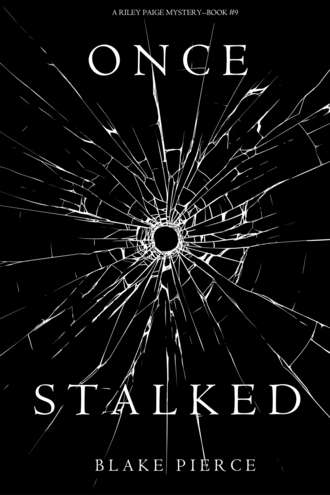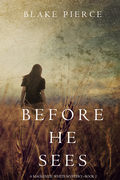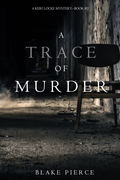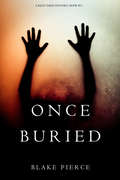
Блейк Пирс
Once Stalked
CHAPTER SIX
The wolf lay on his stomach on the rough desert soil.
That’s how the man thought of himself – a beast stalking his next kill.
He had an excellent view of Fort Nash Mowat from this high place, and the night air was pleasant and cool. He peered at tonight’s prey through the night-vision scope on his rifle.
He thought back to his hated victims.
Three weeks ago it had been Rolsky.
Then came Fraser.
Then came Worthing.
He’d taken them out with great finesse, with shots to the head so clean they surely hadn’t even known a bullet had hit them.
Tonight, it would be Barton.
The wolf watched Barton walking along an unlit path. Although the image through the night scope was grainy and monotone, the target was sufficiently visible for his purposes.
But he wouldn’t shoot tonight’s prey – not yet.
He wasn’t far enough away. Someone nearby might be able to figure out his location, even though he had attached a flash hider to his M110 sniper rifle. He wasn’t going to make the amateurish mistake of underestimating the soldiers on this base.
Following Barton through his scope, the wolf enjoyed the feel of the M110 in his hands. These days the Army was transitioning toward using the Heckler & Koch G28 as a standard sniper rifle. While the wolf knew the G28 was lighter and more compact, he still preferred the M110. It was more accurate, even if it was longer and harder to conceal.
He had twenty rounds in the magazine, but he only intended to use one when the time came to fire.
He was going to take out Barton with one shot, or not at all.
He could feel the energy of the pack, as though they were watching him, giving him their support.
He watched as Barton finally arrived at his destination – one of the base’s outdoor tennis courts. Several other players greeted him as he stepped onto the court and unpacked his tennis gear.
Now that Barton was in the brightly lit area, the wolf had no further need of the night scope. He detached it to use the day optical sight. Then he took aim directly at Barton’s head. The image was no longer grainy, but crystal clear and in full, vivid color.
Barton was about three hundred feet away now.
At that range, the wolf could depend upon the rifle’s precision down to an inch.
It was up to him to stay within that inch.
And he knew that he would.
Just a slight squeeze of the trigger, he thought.
That was all that was needed now.
The wolf basked in that mysterious, suspended moment.
There was something almost religious about those seconds before pulling the trigger, when he waited for himself to will the shot, waited for himself to decide to squeeze with his finger. During that moment, life and death seemed strangely out of his hands. The irrevocable move would happen in the fullness of an instant.
It would be his decision – and yet not his decision at all.
Whose decision was it, then?
He fancied that there was an animal, a true wolf, lurking inside him, a remorseless creature that took actual command over that fatal moment and movement.
That animal was both his friend and his enemy. And he loved it with a strange love that he could only feel toward a mortal enemy. That inner animal was what called out the best in him, kept him truly up to the mark.
The wolf lay waiting for that animal to strike.
But the animal didn’t.
The wolf didn’t pull the trigger.
He wondered why.
Something seems wrong, he thought.
It quickly occurred to him what it was.
The view of the target in the glaring tennis court floodlights through the regular scope was simply too clear.
It would take too little effort.
There was no challenge.
It wouldn’t be worthy of a true wolf.
Also, it was too soon after the last killing. The others had been spaced out to stir up anxiety and uncertainty among the men he loathed. Shooting Barton now would disrupt the psychological rhythmic impact of his work.
He smiled a little at the realization. He got to his feet with his gun and started to walk back the way he’d come.
He felt right about leaving his prey undisturbed for now.
No one knew when he’d strike next.
Not even he himself.
CHAPTER SEVEN
It was still dark when Riley’s commercial flight took off. But even with the time change, she knew it would be daylight in San Diego when she got there. She was going to be in the air for more than five hours and she was already feeling quite tired. She had to be fully functional tomorrow morning when she joined Bill and Lucy for the investigation. There would be serious work to do, and she needed to be ready for it.
I’d better get some sleep, Riley thought. The woman seated next to her already seemed to be dozing.
Riley tilted her chair back and closed her eyes. But instead of falling asleep, she found herself remembering Jilly’s play.
She smiled as she recalled how Jilly’s Persephone had bonked Hades over the head and escaped the Underworld to live life on her own terms.
Remembering how she had first found Jilly made Riley’s heart ache. It had been night in a truck stop parking lot in Phoenix. Jilly had run away from a miserable home life with an abusive father and climbed into the cab of a parked truck. She had fully intended to sell her body to its driver whenever he came back.
Riley shuddered.
What would have become of Jilly if she hadn’t stumbled across her that night?
Friends and colleagues had often told Riley what a good thing she’d done by bringing Jilly into her life.
So why didn’t she feel better about it? Instead, she felt pangs of despair.
After all, there were countless Jillys in the world, and very few of them were ever rescued from terrible lives.
Riley couldn’t help all of them, any more than she could rid the world of all vicious killers.
It’s all so futile, she thought. Everything I do.
She opened her eyes and looked out the window. The jet had left the lights of DC behind, and outside there was nothing but impenetrable darkness.
As she peered into the black night, she thought about her meeting that day with Bill, Lucy, and Meredith, and what little she knew about the upcoming case. Meredith had said that the three victims were shot from a long distance by a skilled marksman.
What did that tell her about the killer?
That killing was a sport to him?
Or that he was on some kind of sinister mission?
One thing seemed certain – the killer knew what he was doing, and he was good at it.
The case was definitely going to be a challenge.
Meanwhile, Riley’s eyelids were feeling heavy.
Maybe I can get some sleep, she thought. Again she leaned her head back and closed her eyes.
*
Riley was staring at what looked like thousands of Rileys, all of them standing at odd angles toward each other, becoming smaller and finally vanishing into the distance.
She turned a little, and so did all the other Rileys.
She lifted her arm, and the others did as well.
Then she reached out, and her hand came in contact with a glass surface.
I’m in a hall of mirrors, Riley realized.
But how had she gotten here? And how was she going to get out?
She heard a voice call out …
“Riley!”
It was a woman’s voice, and somehow familiar to her.
“I’m here!” Riley called back. “Where are you?”
“I’m here too.”
Suddenly, Riley saw her.
She was standing directly in front of her, in the midst of the multitude of reflections.
She was a slight, attractive young woman, wearing a dress that looked many decades out of style.
Riley immediately knew who it was.
“Mommy!” she said in a stunned whisper.
She was surprised to hear that her own voice was now that of a little girl.
“What are you doing here?” Riley asked.
“I just came to say goodbye,” Mommy said with a smile.
Riley struggled to understand what was happening.
Then she remembered …
Mommy had been shot to death right before Riley’s eyes in a candy store when Riley was only six years old.
But here Mommy was, looking exactly the same as when Riley had last seen her alive.
“Where are you going, Mommy?” Riley asked. “Why do you have to go?”
Mommy smiled and touched the glass that stood between them.
“I’m at peace now, thanks to you. I can move on now.”
Little by little, Riley started to understand.
Not long ago, she had tracked down her mother’s killer.
He was now a pathetic old vagrant living under a bridge.
Riley had left him there, realizing that his life had been punishment enough for his terrible crime.
Riley reached out and touched the glass that separated her from Mommy’s hand.
“But you can’t go, Mommy,” she said. “I’m just a little girl.”
“Oh, no, you’re not,” Mommy said, her face radiant and blissful. “Just look at yourself.”
Riley looked at her own reflection in the mirror next to Mommy.
It was true.
Riley was a grown woman now.
It seemed strange to realize that she was now much older than her mother had lived to be.
But Riley also looked tired and sad in comparison with her youthful mother.
She’ll never grow any older, Riley thought.
The same was not true for Riley.
And she knew that her world was full of trials and challenges still to be endured.
Was she ever going to get any rest from it? Would she ever be at peace for the rest of her life?
She found herself envying her mother’s timeless, eternally peaceful joy.
Then her mother turned and walked away, disappearing into the infinite tangle of reflections of Riley.
Suddenly there came a terrible crash, and all the mirrors shattered.
Riley was standing in near-total darkness, up to her ankles in broken glass.
She gently pulled her feet out one by one, then tried to make her way through the wreckage.
“Watch your step,” said another familiar voice.
Riley turned and saw a rugged old man with a lined, hard, and weathered face.
Riley gasped.
“Daddy!” she said.
Her father smirked at her surprise.
“You hoped I was dead, didn’t you?” he said. “Sorry to disappoint you.”
Riley opened her mouth to contradict him.
But then she realized he was right. She hadn’t grieved when he had died last October.
And she certainly didn’t want him back in her life.
After all, he’d scarcely ever said a kind word to her in all his days.
“Where have you been?” Riley asked.
“Where I’ve been all along,” her father said.
The scene began to change from a vast expanse of broken glass to become the outside of her father’s cabin in the woods.
He was now standing on the front stoop.
“You might need my help on this case,” he said. “It sounds like your killer’s a soldier. I know a lot about soldiers. And I know a lot about killing.”
It was true. Her father had been a captain in Vietnam. She had no idea how many men he’d killed in the line of duty.
But the last thing she wanted was his help.
“It’s time for you to go,” Riley said.
Her father’s smirk twisted into a sneer.
“Oh, no,” he said. “I’m just settling in.”
His face and body changed shape. In a matter of moments, he was younger, stronger, dark-skinned, even more menacing than before.
He was now Shane Hatcher.
The transformation struck Riley with terror.
Her father had always been a cruel presence in her life.
But she was coming to dread Hatcher even more.
Much more than her father ever did, Hatcher had some kind of manipulative power over her.
He could make her do things that she’d never imagined she’d do.
“Go away,” Riley said.
“Oh, no,” Hatcher said. “We’ve got a deal.”
Riley shuddered.
We’ve got a deal, all right, she thought.
Hatcher had helped her find her mother’s killer. In return, she allowed him to live in her father’s old cabin.
Besides, she knew she owed him. He’d helped her solve cases – but he’d done much more.
He’d even saved her daughter’s life along with that of her ex-husband.
Riley opened her mouth to speak, to protest.
But no words came out.
Instead, it was Hatcher who spoke.
“We’re joined at the brain, Riley Paige.”
Riley was awakened by a sharp jolt.
The plane had landed in the San Diego International Airport.
The morning sun was rising beyond the runway.
The pilot spoke over the intercom, announcing their arrival and apologizing for the bumpy landing.
The other passengers were gathering their belongings and preparing to leave.
As Riley groggily got up and pulled down her bag from the overhead luggage compartment, she remembered her disturbing dream.
Riley was hardly superstitious – but even so she couldn’t help but wonder …
Were the dream and the rough landing somehow portents of things to come?
CHAPTER EIGHT
It was a bright, clear morning by the time Riley got into her rental car and drove out of the airport. The weather really was wonderful, with a temperature in the comfortable sixties. She realized that it would make most people think of enjoying the beach or at least lying beside a pool somewhere.
But Riley felt a lurking apprehension.
She wondered wistfully if she could ever come to California just to enjoy the weather – or go to any other place to relax.
It seemed that evil awaited her wherever she went.
The story of my life, she thought.
She knew she owed it to herself and her family to break out of this pattern – to take some time off and take the girls somewhere just for the sheer joy of it.
But when was that ever going to happen?
She let out a sad, tired sigh.
Maybe never, she thought.
She hadn’t gotten much sleep on the plane, and she was feeling the jet lag from the three-hour time difference between here and Virginia.
Nevertheless, she was eager to get started on this new case.
As she headed north on the San Diego Freeway, she passed modern buildings punctuated by palm trees and other greenery. Soon she was out of the city, but the traffic on the multi-laned freeway didn’t diminish. The fast-moving procession of closely crowded vehicles wound among rough hills where the early sunlight accentuated a steep, brush landscape.
The scenery notwithstanding, Southern California struck her as less easygoing than she had expected. Like her, everyone in the crush of cars seemed to be in a hurry to get somewhere important.
She took an exit marked “Fort Nash Mowat.” After a few minutes, she pulled up to the camp gate, showed her badge, and was allowed to enter.
She had messaged ahead to let Bill and Lucy know she was on her way, so they were waiting by a car. Bill introduced the uniformed woman standing with them as Colonel Dana Larson, the commander of the Fort Mowat CID office.
Riley was instantly impressed by Larson. She was a strong, sturdy woman with intense dark eyes. Her handshake immediately conveyed to Riley a feeling of confidence and professionalism.
“I’m pleased to meet you, Agent Paige,” Col. Larson said in a crisp, vigorous voice. “Your reputation precedes you.”
Riley’s eyes widened.
“I’m surprised,” she said.
Larson chuckled a little.
“Don’t be,” she said. “I’m in law enforcement too, and I keep up with everything the BAU does. We’re honored to have you here at Fort Mowat.”
Riley felt herself blush a little as she thanked Col. Larson.
Larson called to a nearby soldier, who stepped briskly toward her and saluted.
She said, “Corporal Salerno, I want you to drive Agent Paige’s car back to the rental station at the airport. She won’t be needing it here.”
“Yes ma’am,” the corporal said, “right away.” He got into Riley’s car and drove out of the base.
Riley, Bill, and Lucy got into the other car.
As Col. Larson drove, Riley asked, “What have I missed so far?”
“Not much,” Bill said. “Col. Larson met us here last night and showed us to our quarters.”
“We still haven’t met the CO of the base,” Lucy added.
Col. Larson told them, “We’re on our way to meet Col. Dutch Adams right now.”
Then with a chuckle, she added, “Don’t expect a warm welcome. Agents Paige and Vargas, that means you especially.”
Riley wasn’t sure what Larson meant. Was Col. Adams going to be unhappy that the BAU was sending two women? Riley couldn’t imagine why. Everywhere Riley looked, she saw men and women in uniform mixing freely together. And with Col. Larson on the base, surely Adams was used to dealing with a woman in authority.
Col. Larson parked in front of a clean, modern administrative building and led the agents inside. As they approached, three young men jumped to attention and saluted Col. Larson. Riley saw that their CID jackets were similar to the ones worn by FBI field agents.
Col. Larson introduced the three men as Sergeant Matthews and his team members, Special Agents Goodwin and Shores. Then they all entered a conference room, where they were awaited by Col. Dutch Adams himself.
Matthews and his agents saluted Adams, but Col. Larson did not. Riley realized that it was because she was Adams’s equal in rank. She soon found the tension between the two colonels to be palpable, almost painful.
And as predicted, Adams did look distinctly displeased to see Riley and Lucy.
Now Riley was getting the picture.
Col. Dutch Adams was an old-school career officer who wasn’t at all used to having men and women serve together. And judging from his age, Riley felt pretty sure that he wasn’t ever going to get used to it. He would probably retire with his prejudices intact.
She was sure that Adams must especially resent the presence of Col. Larson on his base – a female officer over whom he had no authority.
As the group sat down, Riley felt an eerie chill of familiarity as she studied Adams’s face. It was broad and long, severely sculpted like the faces of many other military officers she’d known during her life – including her father.
In fact, Riley found Col. Adams’s resemblance to her father to be downright disturbing.
He spoke to Riley and her colleagues in an excessively official tone.
“Welcome to Fort Nash Mowat. This base has been in operation since 1942. It extends for seventy-five thousand acres, has fifteen hundred buildings, and three hundred fifty miles of roads. You’ll find about sixty thousand people here on any given day. I’m proud to call it the finest Army training base in the country.”
At that point, Col. Adams seemed to be trying to suppress a sneer. He wasn’t quite succeeding.
He added, “And for that reason, I ask that you not make nuisances of yourselves as long as you’re here. This place runs like a finely tuned machine. Outsiders have an unfortunate tendency to gum up the works. If you do so, I promise that there will be hell to pay. Do I make myself clear?”
He was making eye contact with Riley, obviously trying to intimidate her.
She heard Bill and Lucy say, “Yes, sir.”
But she said nothing.
He’s not my CO, she thought.
She simply held his gaze and nodded.
He then shifted his eyes to the others in the room. He spoke again with cold anger in his voice.
“Three good men are dead. The situation at Fort Mowat is unacceptable. Fix it. Immediately. Preferably sooner.”
He paused for a moment. Then he said, “There will be a funeral for Sergeant Clifford Worthing at eleven hundred hours. I expect all of you to be in attendance.”
Without another word, he got up from his chair. The CID agents stood and saluted, and Col. Adams left the room.
Riley was dumbfounded. Hadn’t they all come here to discuss the case and what to do next?
Obviously noticing Riley’s surprise, Col. Larson grinned at her.
“He’s not normally so talkative,” she said. “Maybe he likes you.”
Everybody laughed at her bit of sarcasm.
Riley knew that a little humor was a good thing right now.
Things were going to get plenty grim soon enough.
CHAPTER NINE
The laughter subsided, and Larson was still looking at Riley, Bill, and Lucy. Her expression was penetrating and powerful, as if she were assessing them somehow. Riley wondered if the CID commander was about to make some dire announcement.
Instead, Larson asked, “Have any of you had breakfast?”
They all said no.
“Well, that situation is unacceptable,” Larson said with a chuckle. “Let’s fix it before you waste away. Come with me, and I’ll show you some Fort Mowat hospitality.”
Larson then left her team behind and proceeded to guide the three FBI agents into the officers’ club. Riley could see right away that the colonel wasn’t kidding about hospitality. The dining facility was like an upscale restaurant, and Larson wouldn’t let them pay for their own meals.
Over a delicious breakfast, they discussed the case. Riley realized that she had definitely needed coffee. The meal was welcome too.
Col. Larson gave them her take on the case. “The most salient features of these murders are the method of killing and the ranks of the victims. Rolsky, Fraser, and Worthing were all drill sergeants. They were all shot from a long distance with a high-powered rifle. And the victims were all shot at night.”
Bill asked, “What else did they have in common?”
“Not much. Two were white and one was black, so it isn’t a racial issue. They were in command of separate units, so they had no recruits in common.”
Riley added, “You’ve probably already pulled the files of soldiers reprimanded for disciplinary or psychological issues. AWOLs? Dishonorable discharges?”
“We have,” Larson replied. “It’s a very long list and we have been through it. But I’ll send it to you and you can see what you think.”
“I’d like to talk to the men in each unit.”
Larson nodded. “Of course. You can catch some of them after the funeral today, and I’ll set up any additional meetings that you want.”
Riley noticed that Lucy was taking notes. She nodded to the young agent to ask her own questions.
Lucy asked, “What caliber were the bullets?”
“NATO-caliber,” Col. Larson said. “7.62 millimeter.”
Lucy looked at Col. Larson with interest. She said, “It sounds like the weapon might be an M110 sniper rifle. Or possibly a Heckler and Koch G28.”
Col. Larson smiled a little, obviously impressed by Lucy’s knowledge.
“Due to the range, we’re guessing the M110,” Larson said. “The bullets all seem to have been from the same weapon.”
Riley was pleased to see that Lucy was so fully engaged. Riley liked to think of Lucy as her protégé, and she knew that Lucy thought of her as a mentor.
She’s learning fast, Riley thought proudly.
Riley glanced at Bill. She could tell by his expression that he was pleased with Lucy as well.
Riley had questions of her own, but she decided not to interrupt.
Lucy said to Larson, “You’re guessing someone with military training, I assume. A soldier on the base?”
“Possibly,” Larson said. “Or an ex-soldier. Someone with excellent training, at any rate. Not just an average shooter.”
Lucy drummed her pencil eraser against the table.
She suggested, “Someone who has it in for authority figures? Drill sergeants especially?”
Larson scratched her chin thoughtfully.
“I’ve been considering it,” she said.
Lucy said, “I’m sure you’re also considering Islamic terrorism.”
Larson nodded.
“These days, that simply has to be our default theory.”
“A lone wolf?” Lucy asked.
“Maybe,” Larson said. “But it could be that he’s acting on behalf of some group – either a small cell near here, or something international, like ISIS or Al-Qaeda.”
Lucy thought for a moment.
“How many Muslim recruits have you currently got at Fort Mowat?” Lucy asked.
“Right now, three hundred forty-three. That’s obviously a very small percentage of our recruits. But we’ve got to be careful about profiling. In general, our Muslim recruits have been exceptionally dedicated. We’ve never had any problems with extremism – if that’s what this is.”
Larson looked at Riley and Bill and smiled.
“But you two are being very quiet. How would you like to proceed?”
Riley glanced at Bill. As usual, she could tell that he was thinking the same thing as she was.
“Let’s go have a look at the murder scenes,” Bill said.
*
A few minutes later, Col. Larson was driving Riley, Bill, and Lucy through Fort Mowat.
“Which of the locations do you want to see first?” Larson asked.
“Let’s see them in the order they happened,” Riley said.
As Larson drove, Riley noticed soldiers drilling, running obstacle courses, and practicing marksmanship with various weapons. She could see that it was rigorous, demanding work.
Riley asked Larson, “How far along in their training is this round of recruits?”
“The second phase – the White Phase,” Larson said. “We’ve got three phases – red, white, and blue. The first two, red and white, are three weeks each, and these recruits are in their fifth week overall. Their last four weeks will be the Blue Phase. That’s about as tough as tough can get. That’s when the recruits find out if they’ve got what it takes to be an Army soldier.”
Riley heard a note of pride in Larson’s voice – the same pride she’d often heard in her father’s voice when he talked about his military service.
She loves what she does, Riley thought.
She also had no doubt that Col. Larson was excellent at what she did.
Larson parked near a footpath that led through the camp. They got out of the car, and Larson led them to a spot on the path. It was in an open area, free of trees that might block a view.
“Sergeant Rolsky was killed right here,” Larson said. “Nobody saw or heard it happen. We couldn’t tell from the wound or the position of his body where the shot came from – except that it must have been a considerable distance.”
Riley looked all around her, studying the scene.
“What time was Rolsky killed?” she asked.
“At about twenty-two hundred hours,” Larson said.
Riley mentally converted that to civilian time – 10:00 p.m.
She imagined what this place would look like at that time of night. There were a couple of lamps standing within thirty feet of the spot. Even so, the light here would have been pretty dim. The shooter must have used a night scope.
She turned slowly around, trying to guess where the shot came from.
There were buildings to the south and north. It was unlikely a sniper would have the opportunity to fire from within any of those places.
To the west, she could see across camp to the Pacific Ocean, faint in a hazy distance.
There were rough hills to the east.
Riley pointed to the hills and said, “My guess is that the shooter positioned himself somewhere up there.”
“That’s a good guess,” Larson said, pointing to another spot on the ground. “We found the bullet right here, so that indicates the shot must have come from somewhere up in those hills. Judging from the wound, the shot was fired from between two hundred fifty and three hundred feet. We’ve scoured the area, but he didn’t leave any evidence behind.”
Riley thought for a moment.
Then she asked Larson, “Is hunting allowed on Fort Mowat grounds?”
“In season, with permits,” Larson replied. “Right now it’s wild turkey season. Shooting crows by day is also allowed.”
Of course, Riley knew that these deaths were anything but hunting accidents. As the daughter of a man who had been both a Marine and a hunter, she knew that no one would use a sniper rifle to kill crows and turkeys and such. A shotgun was the more likely hunting weapon of choice around Fort Mowat at this time of year.
She asked Larson to take them to the next location. The colonel drove them up into some low hills at the edge of a hiking trail. When they all got out of their vehicle again, Larson pointed to the spot on a trail that wound its way uphill.
“Sergeant Fraser was killed right here,” she said. “He was taking an after-hours hike. The shot seems to have been about the same distance as before. Again, no one heard or saw it happen. But our best guess is that he was killed at about twenty-three hundred hours.”
Eleven o’clock at night, Riley thought.
Pointing to another spot, Larson added, “We found the bullet over here.”
Riley then looked in the opposite direction, toward where the shooter must have been. She saw more scrubby hills – and countless places where a shooter might have hidden. She was sure that Larson and her team had combed the area thoroughly.
Finally they drove down to the area where the recruits’ living quarters were. Larson took them behind one of the barracks. The first thing Riley saw was an enormous dark splotch on the wall near the back door.
Larson said, “This is where Sergeant Worthing was killed. He seems to have come out here for a cigarette before his platoon’s morning formation. The shot was so clean that the cigarette never fell from his lips.”
Riley’s interest quickened. This scene was different from the others – and much more informative. She examined the blotch and the smear that spread down below it.
She said, “It looks like he was leaning against the wall when the bullet hit him. You must have been able to get a much better idea of the bullet’s trajectory than you could for the others.”
“Much better,” Larson agreed. “But not the precise location.”
Larson pointed across the field behind the barracks to where hills began to rise.
“The shooter must have positioned himself somewhere between those two valley oaks,” she said. “But he cleaned up very carefully afterward. We couldn’t find a trace of him in any likely location.”
Riley saw that the distance between the small trees was about twenty feet. Larson and her team had done good work narrowing the area down that much.
“What kind of weather was it?” Riley asked.
“Very clear,” Larson said. “There was a three-quarter moon out almost until dawn.”
Riley felt a tingle down her back. It was a familiar feeling that she got when she was about to really connect with a crime scene.
“I’d like to go out and have a look for myself,” she said.
“Certainly,” Larson said. “I’ll take you there.”
Riley didn’t know how to tell her that she wanted to go by herself.
Fortunately, Bill spoke up for her.
“Let’s let Agent Paige go alone. It’s kind of her thing.”
Larson nodded appreciatively
Riley strode out across the field. With every step, that tingling grew stronger.
Finally, she found herself between the two trees. She could see why Larson’s team hadn’t been able to find the exact spot. The ground was highly irregular with lots of smaller bushes. Just in that area, there were at least a half dozen excellent places to squat or lie and fire a clean shot toward the barracks.
Riley began to walk back and forth between the trees. She knew that she wasn’t looking for anything that the shooter might have left behind – not even footprints. Larson and her team wouldn’t have missed anything like that.
She took some slow breaths and imagined herself here in the very early hours in the morning. The stars were just starting to disappear, and the moon still cast shadows all around.







